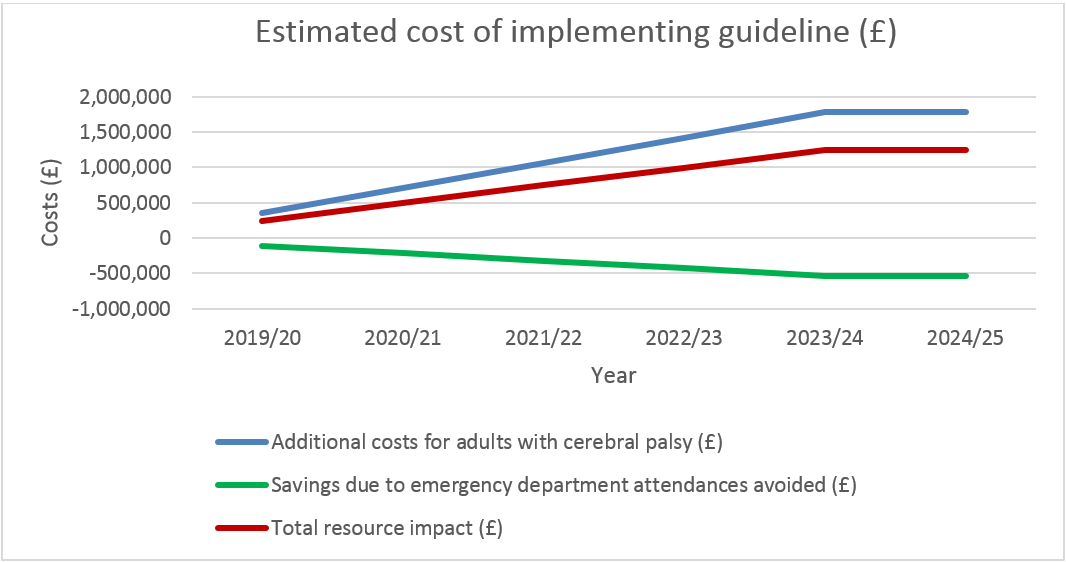Impact on NHS workforce and resources
This NICE guideline on cerebral palsy in adults has been reviewed for its potential impact on the NHS workforce and resources.
Recommendations likely to have an impact on resources
The guideline covers care and support for adults with cerebral palsy. The recommendations that are most likely to have a substantial resource impact are:
- Recommendation 1.1.1 Refer adults with cerebral palsy to a multidisciplinary team experienced in the management of neurological impairments if:
- their ability to carry out their usual daily activities deteriorates or
- a neurosurgical or orthopaedic procedure is being considered that may affect their ability to carry out their usual daily activities.
- Recommendation 1.1.13 Offer an annual review of the person’s clinical and functional needs, carried out by a healthcare professional with expertise in neurodisabilities, for people with cerebral palsy who have complex needs (such as Gross Motor Function Classification System [GMFCS] levels IV and V) and any of the following:
- communication difficulties
- learning disabilities
- living in long-term care settings
- living in the community without sufficient practical and social support (for example, being cared for by elderly, frail parents)
- multiple comorbidities.
Context
Cerebral palsy affects around 1 in 400 live births and life expectancy for people with cerebral palsy is similar to that of the general population. Therefore around 1 in 400 adults have cerebral palsy, equivalent to around 109,000 adults in England.
Cerebral palsy services are commissioned by clinical commissioning groups (CCGs). Providers include NHS hospital trusts, community providers and primary care. Multidisciplinary team appointments and annual reviews are mainly undertaken in a secondary care setting.
Depending on a person’s individual needs, the multidisciplinary team may include: a speech and language therapist, an occupational therapist, a physiotherapist, a psychologist, an orthopaedic surgeon, a neurosurgeon, a neurologist, a social worker, a rehabilitation specialist and specialist nurse.
Resource impact
We estimate that if these recommendations are implemented, it will have the following resource impact:
- An increase in the number of adults with cerebral palsy being referred to a multidisciplinary team. This may lead to an increase in costs for CCGs, providers or both.
- An increase in the number of adults with cerebral palsy and complex needs who have an annual review. This may lead to an increase in costs for CCGs, providers or both.
- An increase in annual reviews for this group of patients is also expected to lead to a small reduction in activity in other services, such as primary care, community crisis services and emergency departments. This could lead to some offsetting savings for CCGs.
- A variable impact across different areas depending on current practice and the availability of specialist staff.
The potential costs and savings to commissioners
There is limited data on referrals to multidisciplinary teams and the number of people with complex needs who have an annual review, so the estimates of costs and savings are subject to some uncertainty. To provide an indicative cost of implementing the guideline[1], we modelled the scenario of an additional 10% of adults with cerebral palsy being referred to a multidisciplinary team and an additional 10% of adults with cerebral palsy and complex needs receiving annual review. We used a forecast for reduced emergency department attendances to estimate potential savings. Based on this modelling, the overall budget impact for England is shown in the table and graph below. This assumes the increase takes 5 years to implement.
Estimated cost of implementing the guideline
| Recommendation |
2019/20 (£) |
2020/21 (£) |
2021/22 (£) |
2022/23 (£) |
2023/24 onwards (£) |
| Referring adults with cerebral palsy to a multidisciplinary team | 213,504 | 487,007 | 730,511 | 974,014 | 1,217,518 |
| Annual review of adults with cerebral palsy and complex needs | 112,186 | 224,371 | 336,557 | 448,743 | 560,928 |
| Total costs | 355,690 | 711,378 | 1,067,068 | 1,422,757 | 1,778,446 |
| Reduced emergency department attendances | (106,968) | (213,935) | (320,903) | (427,871) | (534,838) |
| Net budget impact (£) | 248,722 | 497,443 | 746,165 | 994,886 | 1,243,608 |

- Commissioners and providers should be aware that an increase in the number of adults with cerebral palsy being referred to a multidisciplinary team or for an annual review may lead to an increase in costs for CCGs, providers or both. We encourage commissioners to seek efficient local solutions, such as delivering multidisciplinary team appointments as part of existing neurological rehabilitation services.
- Commissioners should be aware that the savings estimated from implementing these recommendations in the table above may not be as readily identifiable as the costs.
Support to put the recommendations into practice
NICE, NHS England and NHS Improvement support improvements in the care and support of adults with cerebral palsy.
| The guideline resource and implementation panel |
|
The guideline resource and implementation panel reviews NICE guidelines that have a substantial impact on NHS resources. By ‘substantial’ we mean that:
Panel members are from NICE, NHS England, NHS Improvement, Health Education England and when appropriate Public Health England and Skills for Care. Topic experts are invited for discussions on specific topics. The panel does not comment on or influence the guideline recommendations outside of NICE’s usual consultation processes and timelines. |
[1] Commissioners are expected to review their local circumstances and use the resource template to calculate costs and savings at local level. The 10% change in referrals modelled is purely indicative and should not be taken as the cost of implementing guideline at a local level.
This page was last updated: